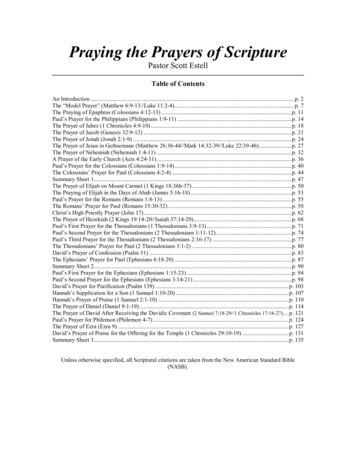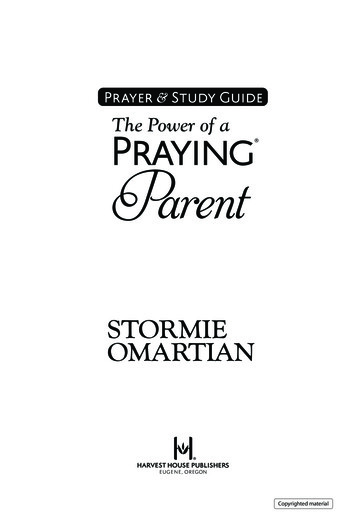
Transcription
Praying the Prayers of ScripturePastor Scott EstellTable of ContentsAn Introduction . p. 2The “Model Prayer” (Matthew 6:9-13//Luke 11:2-4). p. 7The Praying of Epaphras (Colossians 4:12-13) . p. 11Paul’s Prayer for the Philippians (Philippians 1:9-11) . p. 14The Prayer of Jabez (1 Chronicles 4:9-10) . p. 18The Prayer of Jacob (Genesis 32:9-12) . p. 21The Prayer of Jonah (Jonah 2:1-9) . p. 24The Prayer of Jesus in Gethsemane (Matthew 26:36-44//Mark 14:32-39//Luke 22:39-46) . p. 27The Prayer of Nehemiah (Nehemiah 1:4-11) . p. 32A Prayer of the Early Church (Acts 4:24-31) . p. 36Paul’s Prayer for the Colossians (Colossians 1:9-14) . p. 40The Colossians’ Prayer for Paul (Colossians 4:2-4) . p. 44Summary Sheet 1 . p. 47The Prayer of Elijah on Mount Carmel (1 Kings 18:36b-37) . p. 50The Praying of Elijah in the Days of Ahab (James 5:16-18) . p. 53Paul’s Prayer for the Romans (Romans 1:8-13) . p. 55The Romans’ Prayer for Paul (Romans 15:30-32) . p. 58Christ’s High Priestly Prayer (John 17) . p. 62The Prayer of Hezekiah (2 Kings 19:14-20//Isaiah 37:14-20). p. 68Paul’s First Prayer for the Thessalonians (1 Thessalonians 3:9-13) . p. 71Paul’s Second Prayer for the Thessalonians (2 Thessalonians 1:11-12). p. 74Paul’s Third Prayer for the Thessalonians (2 Thessalonians 2:16-17) . p. 77The Thessalonians’ Prayer for Paul (2 Thessalonians 3:1-2) . p. 80David’s Prayer of Confession (Psalm 51) . p. 83The Ephesians’ Prayer for Paul (Ephesians 6:18-20) . p. 87Summary Sheet 2 . p. 90Paul’s First Prayer for the Ephesians (Ephesians 1:15-23) . p. 94Paul’s Second Prayer for the Ephesians (Ephesians 3:14-21) . p. 98David’s Prayer for Purification (Psalm 139) . p. 103Hannah’s Supplication for a Son (1 Samuel 1:10-20) . p. 107Hannah’s Prayer of Praise (1 Samuel 2:1-10) . p. 110The Prayer of Daniel (Daniel 9:1-19) . p. 114The Prayer of David After Receiving the Davidic Covenant (2 Samuel 7:18-29//1 Chronicles 17:16-27). p. 121Paul’s Prayer for Philemon (Philemon 4-7). p. 124The Prayer of Ezra (Ezra 9) . p. 127David’s Prayer of Praise for the Offering for the Temple (1 Chronicles 29:10-19) . p. 131Summary Sheet 3 . p. 135Unless otherwise specified, all Scriptural citations are taken from the New American Standard Bible(NASB).
Praying the Prayers of ScriptureAn IntroductionOf the many passages in Scripture that touch on the topic of prayer, perhaps none is moreinstructive than 1 John 5:14-15, which says, in part: If we ask anything according to His will, He hears us. And if we know that He hearsus in whatever we ask, we know that we have the requests which we have asked fromHim.1According to this passage, there are several conditions for answered prayer. One impliedcondition is actually praying (“ If we ask ”). James 4:2 says: “You do not havebecause you do not ask.” The poet (source unknown) said it this way:Life without purpose is barren indeed;There can’t be a harvest unless you plant seed.If we send no ships out, no ships will come in.Unless there’s a contest, nobody can win,For games can’t be won unless they are played,And prayers can’t be answered unless they are prayed.Another implied condition for answered prayer according to this passage is the personpraying (“ If we ask ”). The “we” is the apostle John and his Christian readers. Byextension, the prayer promise of this passage applies to any person who is a Christian(and presumably living Christianly). Psalm 34:15 and 1 Peter 3:12 say that the Lord’sears are open unto the prayers of the righteous (cf. Proverbs 15:29b). According to James5:16, it is the prayer of a righteous man that accomplishes much. First John 3:22 says:“And whatever we ask we receive from Him, because we keep His commandments anddo the things that are pleasing in His sight.” Conversely, Psalm 66:18 says that the Lordwill not hear the prayers of the wicked (cf. Proverbs 15:29b, 28:9, Isaiah 1:15 and 59:2b,Micah 3:4, and 1 Peter 3:7).Yet a third implied condition for answered prayer according to this passage is thepersistence of the prayer (“ If we ask ”). The Greek verb translated “ask” is in thepresent tense; therefore, it can literally read: “ If we are asking ” That persistenceis a condition for answered prayer is seen in Matthew 7:7-8//Luke 11:9-10, where theGreek verbs used, translated “ask,” “seek,” and “knock,” are in the present tense; so,“keep asking,” “keep seeking,” and “keep knocking.” Persistence in prayer is prescribeddirectly in such passages as Romans 12:12, Ephesians 6:18, Colossians 4:2, and 1Thessalonians 5:17 and indirectly in such passages as Luke 11:5-8 and 18:1-5. It is also1Unless otherwise indicated, all Scriptural references in this series are taken from theNew American Standard Bible (NASB).2
patterned by the church of Jerusalem in Acts 2:42; by Paul in Romans 1:9, Colossians 1:3and 9, 1 Thessalonians 3:10, 2 Thessalonians 1:11, and 2 Timothy 1:3; and by Epaphrasin Colossians 4:12.While 1 John 5:14-15 gives several implicit conditions for answered prayer (praying, theperson praying, and the persistence of the prayer),2 its main point is to give one explicitcondition for answered prayer, which pertains to the prayer itself. It is: “ If we askanything according to His will ” The key, then, to answered prayer is prayingaccording to God’s will. Jesus, in John 14:13-14, essentially said the same, when Hesaid: “Whatever you ask in My name, that will I do If you ask Me anything in Myname, I will do it” (cf. John 15:16b and 16:23-24). Prayer is not about getting our willdone in Heaven (James 4:3); rather, it is about getting God’s will done on earth (Matthew6:10b, Matthew 26:39//Mark 14:36//Luke 22:42, and Matthew 26:42). As D. EdmondHiebert has written (The Epistles of John, p. 256): “Prayer is not a device for imposingour will upon God, but rather the bending of our will to His in the desire that His goodwill may be done.” W. Bingham Hunter (The God Who Hears, p. 12; emphasis his) adds:“ I passionately disagree with the notion that prayer is a way to get from God what wewant. Christian prayer, as explained in Scripture, seems something else entirely: Prayeris a means God uses to give us what he wants.”This, of course, begs the question: How can we know God’s will and, therefore, prayaccording to it? If the only way to know God’s will is through His Word (theReformation principle of sola Scriptura; the Baptist distinctive of the Bible as the onlyrule of faith and practice; the doctrine of the sufficiency of Scripture—2 Timothy 3:17and 2 Peter 1:3-4; the cessation of all other means of special revelation with thecompletion of the canon of Scripture at the end of the first century A.D.—1 Corinthians13:8-10), then the key to answered prayer is praying according to God’s will as revealedin Scripture.3 This is why Jesus can say in John 15:7: “If you abide in Me, and My2Other conditions for answered prayer include praying fervently (Luke 22:44, Romans15:30, Colossians 4:12, and James 5:17) and praying in faith (Matthew 21:22//Mark11:24, Hebrews 11:6, and James 1:5-7).3W. Bingham Hunter, in his book on prayer entitled, The God Who Hears (p. 104),writes: “Effectiveness in prayer will always be coupled with regular reading,memorizing of and meditating on Scripture. I see almost no potential to become a socalled prayer warrior where systematic Bible reading and study are absent. The Bible isthe only divinely inspired guidebook to the will and thought of God. And learning topray effectively boils down largely to learning to think like God and understand His will.Read the Book.” D. Edmond Hiebert (Working with God Through Intercessory Prayer,p. 108) writes regarding George Mueller, who, according to Donald Whitney (Prayingthe Bible, p. 82), had over 50,000 specific answers to prayer recorded in his journals:“We must learn to use the Bible as the guide for our praying. Prayer nourished andguided by the Word of God will be effective. George Mueller, a noted man of prayer,used this secret. For some years he had followed the custom of praying first and thenreading the Bible, with no special connection between the two. Then he was led to turn3
words abide in you, ask whatever you wish, and it will be done for you.” Commentingon this verse, Edwin Blum (“John,” in The Bible Knowledge Commentary, 2:326) states:“Christ’s words condition and control such a believer’s mind so that his prayers conformto the Father’s will. Since his prayer is in accord with God’s will, the results are certain.”And, so, D. A. Carson (A Call to Spiritual Reformation, pp. 32-33) counsels: “ [O]ne ofthe most important elements in intercession is to think through, in the light of Scripture,what it is God wants us to ask for.”Practically, this means praying specifically for what the Bible explicitly reveals to be thewill of God, which includes: The salvation of sinners (1 Timothy 2:4 and 2 Peter 3:9; cf. Ezekiel 18:23, 32, and33:11), as did Paul in Romans 10:1The sanctification of saints (1 Thessalonians 4:3), as did Jesus (Luke 22:32 andJohn 17:17) and as did Paul (as shall be seen by an examination of his prayers inthis series)This also means praying specifically for what the Bible explicitly says we ought to bepraying for, which would include such things as: Our enemies (Matthew 5:44//Luke 6:28)Laborers for the harvest (Matthew 9:38)Political leaders (1 Timothy 2:1-2)Other believers (Ephesians 6:18 and James 5:16)This also means perusing the prayers of Scripture, with the purpose of patterning ourprayers after them, which is what this series on “Praying the Prayers of Scripture” is allabout. The goals of this series include:1)2)Teach through some of the many prayers recorded in ScriptureTake time to pray each Wednesday night according to the prayer taught thatparticular nightand therebythe process completely around; after a word of invocation to have the Spirit’s teaching,he now spent hours pouring over the Word, filling himself with the living Word of God;after this, in the very mind of Christ which he had thus received, he poured out praise,prayer, and supplication in great fullness and assurance.” Donald Whitney (in hisPraying the Bible, p. 7) mentions how God used one R. F. Gates “in ways neither of uscould have ever imagined in that moment on March 1, 1985, when [he] held up the Bibleand said, ‘When you pray, use the prayer book!’”4
3)Train us to habitually pray according to the will of God as revealed in Scripture inorder to make us more effective in our praying by having more of our prayersansweredHere is an initial list of some of the prayers of Scripture4, which will serve as a repertoirefrom which this series will draw its topics:The prayer of Abraham for Sodom (Genesis 18:23-33)The prayer of Jacob when Esau was coming to meet him (Genesis 32:9-12)The prayers of Moses for Israel (Exodus 32:11-14 and Numbers 14:13-20)The prayer of Jabez (1 Chronicles 4:9-10)The prayers of Hannah (1 Samuel 1:10-20 and 2:1-10)The prayers of David After receiving the Davidic covenant (2 Samuel 7:18-29//1 Chronicles 17:16-27) After receiving the offering for the rebuilding of the temple (1 Chronicles 29:1019) In the Psalms (51, 86, 139, et. al.)The prayers of Solomon For wisdom (1 Kings 3:5-14//2 Chronicles 1:7-12) At the dedication of the rebuilt temple (1 Kings 8:22f)The prayers of Elijah On Mount Carmel when contending with the prophets of Baal (1 Kings 18:36-37) For no rain and rain in the days of Ahab (James 5:16b-18)The prayer of Hezekiah when threatened by Sennacherib of Assyria (2 Kings 19:1420//Isaiah 37:14-20)The prayer of Ezra over Israel’s sin of intermarrying with pagans (Ezra 9:5-15)The prayer of Nehemiah upon hearing of the condition of Jerusalem (Nehemiah 1:4-11)The prayer of the Levites at the renewal of the covenant (Nehemiah 9:4-38)The prayer of Job (Job 42:1-6)The prayer of Jeremiah (Jeremiah 32:16-25)4For a more extensive list of such prayers, one may consult the appendix entitled“Scriptures on Prayer” in W. Bingham Hunter’s The God Who Hears (pp. 201-207).5
The prayer of Daniel for the end of the Babylonian captivity (Daniel 9:1-19)The prayer of Jonah in the belly of the whale (Jonah 2)The prayers of Christ The Model Prayer (Matthew 6:9-13//Luke 11:2-4) His high priestly prayer (John 17) In the Garden of Gethsemane (Matthew 26:36-44//Mark 14:32-39//Luke 22:3946)The prayer of the church of Jerusalem for boldness in the midst of persecution (Acts4:24-31)The prayers of Paul5 For the Romans (Romans 1:9-13) For the Ephesians (Ephesians 1:15-23 and 3:14-19) For the Philippians (Philippians 1:9-11) For the Colossians (Colossians 1:9-14) For the Thessalonians (1 Thessalonians 3:9-13, 2 Thessalonians 1:11-12, and2:16-17) For Philemon (Philemon 4-7)Prayers for Paul By the Romans (Romans 15:30-32) By the Ephesians (Ephesians 6:18-20) By the Colossians (Colossians 4:2-4) By the Thessalonians (2 Thessalonians 3:1-2)The prayer of Epaphras for the Colossians (Colossians 4:12)Also to be added to this list are the various doxologies in Scripture.5A highly-recommended resource on the prayers of Paul is D. A. Carson’s A Call toSpiritual Reformation: Priorities from Paul and His Prayers.6
Praying the Prayers of ScriptureThe “Model Prayer6”Matthew 6:9-13//Luke 11:2-4If we are to learn to pray according to God’s will as revealed in Scripture, what betterway to begin than by praying according to the model prayer presented by our Master.Of the many topics that Jesus touched on in His Sermon on the Mount (Matthew 57//Luke 6:20-49), prayer was a prominent one (Matthew 6:5-15//Luke 11:2-4 andMatthew 7:7-11//Luke 11:9-13). After teaching us how not to pray (Matthew 6:5-87),Jesus teaches us how to pray, in Matthew 6:9-13 (cf. Luke 11:2-4), saying:“’Pray, then, in this way: “Our Father who is in heaven, Hallowed be Your name. “Yourkingdom come. Your will be done, On earth as it is in heaven. “Give us this day our dailybread. “And forgive us our debts, as we also have forgiven our debtors. “And do not leadus into temptation, but deliver us from evil. [For Yours is the kingdom and the power andthe glory forever. Amen.”]’”8Contrary to the impression given by the ritualistic way in which this prayer is recited byso many today, Jesus is not requiring us to pray these words verbatim. Notice that Hedoes not say, “Pray this”; rather, He says, “Pray in this way.” In other words, pray likethis. Though we may not necessarily use the exact words Jesus used, we are to prayaccording to the concepts communicated by the words that He used.6This prayer has traditionally been referred to as “the Lord’s Prayer.” However, it maybe preferable to refer to it as the “Model Prayer,” while referring to Jesus’ prayer in John17 as “the Lord’s Prayer.”7One’s purpose for praying should not be to be praised by people (Matthew 6:5-6). Norshould one’s praying be ritualistically repetitious (Matthew 6:7-8). It seems ironic that,after Jesus teaches us not to be ritualistically repetitious in prayer (Matthew 6:7-8), Heteaches a prayer (Matthew 6:9-13) that today tends to be ritualistically recited more thanbeing actually prayed.8One will notice that the NASB places brackets around the concluding words of itstranslation of these verses. It does so because these words are not found in what aregenerally considered to be the most accurate Greek manuscripts of this text (those closestin time to the original). For this same reason, these words are not found in the text of theESV or NIV, though they are mentioned by way of footnote. As with all other suchtextual (and, thus, translational) discrepancies between such English versions, this is amatter of disagreement over the genuine reading of a particular text, not a matter ofdenial of biblical truth.7
Before identifying what these concepts are, notice that this prayer is directed to God theFather (“our Father who is in heaven”). While there are occasions in Scripture that wefind prayer addressed to God the Son (for example, Acts 8:59-60 and 2 Thessalonians2:16), typically it is addressed to God the Father. This is not to suggest, however, that theother members of the Godhead are not involved, as such prayer is to be to the Father,through the Son (John 14:6, Ephesians 3:12, 1 Timothy 2:5, and Hebrews 10:19), and bythe Holy Spirit (Ephesians 6:18 and Jude 20).9 See especially Ephesians 2:18.The concepts communicated by Christ in the Model Prayer that are to be part of ourpraying include, first of all10, those that concern God’s glory. More specifically, theyinclude prayer for: God to be number one (“Hallowed be Your name”). While God’s very name is tobe treated as sacred (see Exodus 20:7//Deuteronomy 5:11, the Third of the TenCommandments), in Jewish thought, “name” stands for the person named. So,this is a prayer that God Himself would be revered, both in our lives and in thelives of others. So, our first and foremost concern in prayer should be that Godwould be first and foremost. This is seen by prayers that begin with praise forGod’s person, such as Hannah’s prayer in 1 Samuel 2:1f and David’s prayer in 1Chronicles 29:10f. The acronym for prayer, A (Adoration) C (Confession) T(Thanksgiving) S (Supplication) reminds us of this. This is also seen by prayersthat ultimately ask for an answer that will glorify God11, such as David’s prayer in2 Samuel 7:18f//1 Chronicles 17:16f (see especially 2 Samuel 7:25-26a//1Chronicles 17:23-24a), Elijah’s prayer in 1 Kings 18:36-37 (see especially verse37), Hezekiah’s prayer in 2 Kings 19:14f//Isaiah 37:14f (see especially 2 Kings9Bruce Ware, in his book, Father, Son, and Holy Spirit: Relationships, Roles, andRelevance, writes (p. 18): “If Jesus taught us to pray to the Father, then we ought to dothis. For one reason or another, we sometimes follow a different practice. We mayencourage our children, especially, to open their prayers with, ‘Dear Jesus,’ despite thefact that Jesus said to pray ‘Our Father in heaven ’ Perhaps we do not think aboutprayer as we should because we do not understand the doctrine of the Trinity. As Jesustaught us, we should pray to the Father through the Son. Jesus Christ is the mediator. Heis the one through whom we address the Father. He is the one who brings us access tothe Father. Our prayers bring spiritual benefit only when we pray in his name. Andprayers that bring fruit in the kingdom are those offered in the power of the Spirit. Wepray as the Spirit prompts and urges us to pray. So prayer rightly understood—Christianprayer—is prayer to the Father, through the Son, in the power of the Spirit.”10Notice that the initial focus of the prayer is on God (“ Your name. Your kingdom Your will ”), with only the subsequent focus being on us (“ our daily bread ourdebts ,” etc.).11D.A. Carson (A Call to Spiritual Reformation, p. 203) asks: “Has God become socentral to all our thoughts and pursuits, and thus to our praying, that we cannot easilyimagine asking for anything without consciously longing that the answer bring glory toGod?”8
19:19//Isaiah 37:20), and Jesus’ prayer in John 17:1f (see especially verse 1). Seealso John 14:13. God’s kingdom to come (“Your kingdom come”). God’s kingdom on earth willcome when Christ comes again to earth to rule over it during the Millennium.That the second coming of Christ is something for which believers are to bepraying is seen by 1 Corinthians 16:22’s “Maranatha,” an Aramaic word meaning“Our Lord come” (so NIV), and by the last prayer request recorded in the Bible,Revelation 22:20’s “Come, Lord Jesus.” Could it be that we are not praying forthis as we should because we are not pining for it as we should (as Romans 8:19,23, 25, 1 Corinthians 1:7, Galatians 5:5, Philippians 3:20, and Titus 2:13 says weshould be)? God’s will to be done (“Your will be done, On earth as it is in heaven”). Thepoint has already been made (see the introductory lesson to this series) that prayeris not about getting our will done in heaven, but about getting God’s will done onearth (see also Matthew 26:39//Mark 14:36//Luke 22:42, Matthew 26:42, and 1John 5:14-15). Thus, we should be continually seeking to increase our knowledgeof His will by continually increasing our knowledge of Scripture. While prayingaccording to God’s revealed/declared will (“the things revealed,” Deuteronomy29:29), we should be prepared to accept God’s secret/decreed will (“the secretthings,” Deuteronomy 29:29) once it comes to pass.The concepts communicated by Christ in the Model Prayer that are to be part of ourpraying not only include those that concern God’s glory, but also those that concern ourgood. That God wants to use prayer as a means for our good is seen in Matthew 7:711//Luke 11:9-13. These good things include prayer for: Food (“Give us this day our daily bread”). Though we do not live in a “dailybread” culture, as did those to whom Jesus originally spoke these words, a culturein which earning money to buy food, purchasing food, and consuming foodtypically occurred on the same day, we are just as dependent on God for the foodthat sustains our lives (see Psalm 145:15 and Acts 14:17). Do our prayer livesreflect this belief, particularly our mealtime prayers? Based on what is said inPsalm 37:25, we can pray this prayer with confidence, provided we are abiding bythe means mandated in 2 Thessalonians 3:10. Forgiveness (“And forgive us our debts, as we also have forgiven our debtors”).The idea of “debts” here is sins. While all the sins of the believer have alreadybeen judicially/positionally forgiven (Colossians 2:13; cf. 1 John 1:7 and 9) due totheir being imputed to Christ (2 Corinthians 5:21; cf. Ephesians 1:7, Colossians1:14, 1 John 1:7, and Revelation 1:5), the believer’s practice is to match hisposition. Thus, a true believer is one who will be regularly confessing hissins/asking forgiveness for them (1 John 1:9). A true believer is also one whowill be regularly forgiving those who sin against him. One who is unwilling to9
forgive others, however, shows himself to be unforgiven/an unbeliever (Matthew6:14-15//Mark 11:25-26 and 18:21-35). Freedom from sin (“And do not lead us into temptation, but deliver us from evil”).Jesus also spoke of this in the Garden of Gethsemane (see Matthew 26:41//Mark14:38//Luke 22:40 and Luke 22:46). This is not to be understood as if God wouldever tempt us to sin (James 1:13). Rather, it is to be understood as a prayer forHis help in keeping Satan from successfully tempting us to sin. Jesus prays thisway for the believer in John 17:15. This is a prayer God is pleased to answer (2Thessalonians 3:3), provided we avail ourselves of the means God has provided,such as fleeing (1 Timothy 6:11 and 2 Timothy 2:22; cf. Genesis 39:12). AsElisabeth Eliot has said (Quest for Love, p. 189): “It is no good praying, ‘Lead usnot into temptation’ and then deliberately walking straight into it.”10
Praying the Prayers of ScriptureThe Praying of Epaphras12Colossians 4:12-13As Paul typically does when concluding his letters, so when concluding his letter to thechurch at Colossae, he sends greetings to the church from various individuals who arewith him. With Paul in Rome when he wrote Colossians were his Jewish companions:Aristarchus; Mark; and Jesus, or Justus (Colossians 4:10-11). His Gentile companionsincluded Epaphras, Luke, and Demas (Colossians 4:12-14). When speaking of Epaphras,Paul writes in verses 12-13:Epaphras, who is one of your number, a bondslave of Jesus Christ, sends you hisgreetings, always laboring earnestly for you in his prayers, that you may stand perfectand fully assured in all the will of God. For I testify for him that he has a deep concernfor you and for those who are in Laodicea and Hierapolis.What do we know about this man? We know that:1.He was a planter. According to Colossians 1:5b-7a, Epaphras was apparently theone God used to give birth to the body of believers in Colossae. This wouldlikely have been in the mid-50s A.D. According to what Paul says at the end ofColossians 4:13, Epaphras may have also given birth to the churches in theneighboring cities of Laodicea (cf. Colossians 2:1, 4:15-16, and Revelation 3:1422) and Hierapolis. This would explain his deep concern for the Colossians(Colossians 4:13).2.He was a pastor. Not only does it appear as though Epaphras was the“obstetrician” of the church of Colossae, but also its “pediatrician” (seeColossians 1:7b and the start of 4:12). This would further explain his deepconcern for the Colossians (Colossians 4:13).3.He was a prisoner. Apparently, Epaphras journeyed from Colossae to Rome tovisit Paul in his imprisonment and, in so doing, became a fellow prisoner withPaul (see especially Philemon 23; cf. Colossians 1:7’s “our beloved fellow bondservant” and 4:12’s “a bondslave of Jesus Christ”). Consequently, Epaphras wasunable to be the one to carry the letter of Colossians to the Colossian church, atask that fell to a man named Tychicus (Colossians 4:7-8). Also as a result ofEpaphras’ imprisonment, a man named Archippus became the interim pastor(Colossians 4:17 and Philemon 2). Though Epaphras could not personally pastorthe Colossians, he could pray for them.12For more on the praying of Epaphras, one may consult chapter 7 (pp. 69-79) of D.Edmond Hiebert’s Working With God Through Intercessory Prayer.11
4.He was a prayer warrior. In Colossians 4:12-13, we see how he prayed and whathe prayed for the church at Colossae How Epaphras prayedo He prayed for others. While we presume that Epaphras took time topray about his predicament of imprisonment, his predicament did notprevent him from praying for his parishioners. While Jesus prayed forHis predicament (see His praying in the Garden of Gethsemane inMatthew 26:39//Mark 14:36//Luke 22:42), He also prayed for others inthe midst of it (see His praying in John 17 and His prayer on the Crossin Luke 23:34). Stephen likewise prayed for others in the midst of hispredicament (see Acts 7:60).o He prayed frequently. Colossians 4:12 says that he prayed “always.”This same verse describes his praying in the plural (“prayers”).Frequency in prayer is also found in Psalm 55:17, Daniel 6:10,Matthew 7:7-8//Luke 11:9-10, Luke 11:5-8, 18:1-5, Acts 2:42,Romans 1:9, 12:12, Ephesians 6:18, Colossians 1:3, 9, 4:2, 1Thessalonians 3:10, 5:17, 2 Thessalonians 1:11, and 2 Timothy 1:3.o He prayed fervently. Colossians 4:12 says that he was “laboringearnestly” in his prayers (NIV: “wrestling in prayer”). The Greekword is agonizomai, from which we get our English word, agony.13So, not only was their breadth to Epaphras’ praying, but also depth;not only quantity, but also quality; not only length, but also strength.Fervency in prayer is also found in Luke 22:44 (cf. Hebrews 5:7),Romans 15:30, and James 5:17. Well has it been said by the legendarylate 18th/early 19th century missionary to the Muslims, SamuelZwemer, that prayer is “the gymnasium of the soul.”o He prayed fondly. Colossians 4:13 mentions Epap
4 words abide in you, ask whatever you wish, and it will be done for you."Commenting on this verse, Edwin Blum ("John," in The Bible Knowledge Commentary, 2:326) states: "Christ's words condition and control such a believer's mind so that his prayers conform










